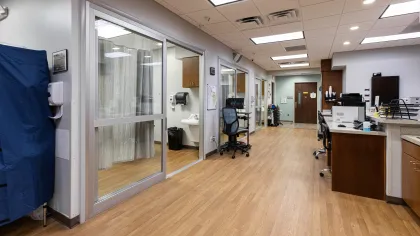Spermatoceles
Symptoms of Spermatocele
- Pain or discomfort in the affected testicle
- Heaviness in the enlarged testicle
- Fullness behind and above the testicle
Since a mass in your scrotum can be a sign of other issues, it is important to see your doctor if you feel any kind of lump on or near your testicles. For more information, schedule an appointment today or call to speak with one of our patient coordinators.

3 Step Journey To Success

Diagnosis and Monitoring

Management

Surgical Intervention
Causes & Treatments
Causes
There is no known cause of spermatoceles. They are not cancerous and do not increase your risk of testicular cancer. Spermatoceles are not considered by doctors to cause infertility. If the spermatocele is large, the quantity and quality of sperm may be lessened. If you have been trying to conceive for a year or more and are concerned about your fertility, consult with a licensed physician.
Treatments
Your spermatocele most likely will not go away on its own, however, most spermatoceles do not need treatment. Typically, most spermatoceles do not cause pain or complications and if they do, your doctor will most likely recommend over-the-counter pain relievers such as acetaminophen or ibuprofen.
Surgery for spermatocele, called spermatocelectomy, is the most common form of treatment for a painful spermatocele. During this outpatient procedure, the cyst will be removed from the epididymis while preserving the genital and reproductive system. It can be done with local or general anesthesia and usually takes less than an hour to perform.

Schedule Appointment Online
Frequently Asked Questions (FAQs) About Spermatoceles
Q What Is a Spermatocele?
A spermatocele is a fluid-filled cyst that develops in the epididymis, the small coiled tube located behind the testicle that stores and transports sperm. These cysts are typically noncancerous, painless, and filled with a clear or milky fluid containing sperm. While they usually do not cause serious health issues, larger spermatoceles can lead to discomfort or a feeling of heaviness in the scrotum.
Q How Is a Spermatocele Diagnosed?
A spermatocele is typically diagnosed during a physical examination, where a doctor may feel a smooth, round mass in the scrotum. To confirm the diagnosis, a scrotal ultrasound may be performed to differentiate the cyst from other conditions such as testicular tumors or hydroceles. In most cases, additional testing is not needed unless symptoms worsen or other abnormalities are detected.
Q Can a Spermatocele Affect Fertility?
In most cases, a spermatocele does not affect fertility, as it does not interfere with normal sperm production or ejaculation. However, if the cyst becomes very large or if surgical removal is needed, there is a slight risk of damaging the epididymis or surrounding structures, which could impact sperm transport. If fertility is a concern, discussing options with a urologist before undergoing treatment is recommended.
Q Can a Spermatocele Go Away on Its Own?
No, spermatoceles do not go away on their own, but they often remain unchanged in size or grow very slowly over time. Many men live with spermatoceles without any issues, and treatment is usually unnecessary unless the cyst becomes large or painful. If symptoms worsen, a doctor may recommend monitoring or discuss potential treatment options.
